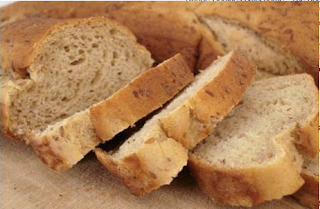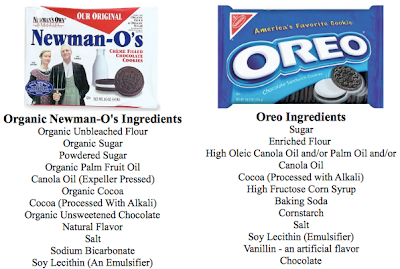 |
| http://www.whatwereeating.com/recipes/thyme-for-some-salmon/ |
Wow that's cool neely, I've never liked soy because I never felt it was food and certainly was worried about growing titties from it. I guess consuming soy may counteract my ongoing testosterone therapy (laugh track hhhaaaaa)
Do take a look at this one:
I feel that I'm somewhat eating food when I use it.
Give us the lowdown on this type of protein.
PS: i dont feel that whey is food either, except if I have it once in a blue moon. Egg protein i suspect is better but its so expensive...
I looked at the protein powder he linked me to, which is a rice protein/pea protein mix. It's a mix because rice and pea are both low in certain amino acids (the building blocks of protein), but when put together they sort of complete each other. Here's my response to his email:
About your question. I have a question for you in return. Why do you use protein powder?
About your pea/rice protein powder:
1. It's not organic, so there's a good chance you're getting GMO's and pesticides, among other things. Not good.
2. Rice and peas both contain lectins and phytates - anti-nutrients - so they're not the easiest things in the world to digest, even after they've been über-processed to make the powder.
3. It says they're "hypo-allergenic", unlike whey, soy and egg. Bullshit. The term "hypo-allergenic" is misleading and arbitrary. We all are sensitive to different foods. You might be sensitive to rice, and I might be sensitive to soy. Turns out that A LOT of people are sensitive to rice.
4. You said you thought egg protein is probably better for you. No, egg protein isn't necessarily better for you. Why not just eat eggs???? I just called 3 distributors of egg white protein powders, only one of whom could even vaguely describe how the protein powder was made. [What I gathered is that] it's basically separated from the yolk, pasteurized for a few minutes in 134 degree heat and then spray dried, which is drying it with more heat to make a powder. I'm not saying that cooking eggs isn't a good idea, but who knows how high the heat is, for how long they heat it, and where the eggs come from in the first place. One of the 2 big egg white protein powder manufacturers is in China, although I had to find that out for myself since the guy at Jay Robb's refused to give me their manufacturer's name... In my opinion, it's these kinds of overly processed foods that make us have sensitivities. I've had more people come in lately who were like, "I didn't used to be sensitive to eggs (or soy), but then I started eating an egg (or soy) protein powder every day for a couple of years and now I can't touch the stuff without getting (enter symptom here)."
You may have gathered from this exchange that 1) my friends are perverted 2) I am not a huge fan of my friend's protein powder and 3) I like to call food peddlers and antagonize them. The guy at Jay Robb's hung up on me because I was asking questions he didn't want to answer (and that's definitely not the first time that's happened to me). The truth was that he was upset because he didn't know the answers because he had not done proper research on his manufacturer. Doesn't that scare you? In an ideal world, you would be told up front where your food came from and how it was made. But in this world, there's no good reason to trust people who are selling food to you. It's their job to persuade you to buy the food they distribute, so why would they disclose anything bad about it? They're no different than used car salespeople (no offense to any used car salespeople out there).
Back to egg white protein powder. Unless it states that you're eating lightly heated eggs from pasture raised chickens, you're most likely getting eggs that were factory farmed, born from mangy, abused chickens with their beaks cut off who were fed their own manure and a constant stream of antibiotics. That was not a hyperbolic sentence. It's gross how conventional eggs are produced. Here's a video.
By the way, this does NOT mean you should stop eating eggs. I get my eggs from a local family farm for $3.50 per dozen. The chickens run around all day on the land eating bugs, grass and grains. Plenty of the eggs at health food stores come from humanely raised chickens, too. You just have to do your research.
So if you're going to use egg white protein powder, do it knowing where those eggs came from and how they were processed, but good luck with that. Eggs are probably the cheapest form of animal protein we can buy, though, so why not just eat them instead?
Whey Protein Powder
Here is my top issue with whey. Unless it's organic, the milk they use to obtain the whey comes from factory farmed animals, which means it's devoid of many nutrients and chock full of antibiotics, hormones, pesticides and pus. Yes, pus. The cows are almost always mistreated, as well. The poor ladies in the video below are who you get your non-organic dairy products from. This means your milk, cheese, butter, yogurt and any products you buy that contain cheese, butter or milk. Pizza, cookies, most dressings, sauces, marinaras, lattes, soups, you name it...
Don't go turning vegan on me now, though. You generally won't see abuse and neglect like that on small, family farms or organic farms. Again, you have to do your research. Despite the fact that you can buy organic whey protein powder, there are still plenty of problems with organic dairy products. Namely pasteurization and homogenization.
Pasteurization
Isn't pasteurization what keeps the nasty bacteria out of your milk? Well, yes, but without factory farms and with proper treatment of dairy cattle, you wouldn't need that. When cattle aren't packed into small places covered in their own shit all the time, plagued by open sores and infections in their udders, they produce some pretty clean milk. When milk is pasteurized, it's heated in order to kill bacteria. In the process of heating it, they not only kill bad and good bacteria, but they rid the milk of all kinds of beneficial enzymes, which not only help you to digest the milk itself but also give you access to its beneficial minerals and other nutrients. You're left with dead milk, which doesn't do anybody much good. Pasteurized milk is linked with chronic ear infections, eczema, acne, digestive problems, increased allergies and more. Look into finding a source of raw (unpasteurized) milk and read this website about it. When they started feeding dairy cows sludge instead of grass, the cows began producing awful milk, devoid of nutrients and full of killer bacteria. People became afraid of raw milk after that, and we still are afraid of it. Give it a chance and read all about it. It might just turn your life around.
Homogenization
We do this to milk so that it won't separate. It's just another chance for heat to touch the fragile milk. It also renders more nutrients unavailable to us from the milk. And all because we don't like the cream on the top because God forbid we eat cream - it's so FATTY! Ewwwww! (That was a joke, by the way.)
As far as your whey protein powder goes, I say drink raw milk and eat raw cheese instead. They're pretty good sources of protein, too.
In summation, don't eat soy protein powder. Don't eat egg white protein powder, pea, rice, or whey protein powder. That is, if you can avoid it, and I think you can.



























